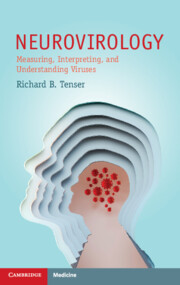Book contents
- Neurovirology
- Neurovirology
- Copyright page
- Dedication
- Contents
- Preface
- 1 Introduction to Virology
- 2 Measurement of Infectious Virus
- 3 Molecular Biology
- 4 The Immune System
- 5 Viral Pathogenesis
- 6 Viral Infections of the Nervous System
- 7 Neurovirology and Immunology
- 8 Experimental Neurovirology
- 9 The Future
- References
- Index
- References
8 - Experimental Neurovirology
Published online by Cambridge University Press: 13 July 2023
- Neurovirology
- Neurovirology
- Copyright page
- Dedication
- Contents
- Preface
- 1 Introduction to Virology
- 2 Measurement of Infectious Virus
- 3 Molecular Biology
- 4 The Immune System
- 5 Viral Pathogenesis
- 6 Viral Infections of the Nervous System
- 7 Neurovirology and Immunology
- 8 Experimental Neurovirology
- 9 The Future
- References
- Index
- References
Summary
Latent herpes simplex virus (HSV) infection of the nervous system is an infection of neurons of sensory ganglia. During latency the viral DNA is present but minimal expression of viral functions is evident – only one viral RNA termed latency associated transcript (LAT).
While the nucleoside analog acyclovir is effective against HSV infections it cannot clear latent HSV infections. To investigate mechanisms of neuronal HSV latency and reactivation, studies were performed with HSV mutants that are resistant to acyclovir. Such mutants grow poorly in non-dividing cells, such as neurons.
Latent infections by such mutants expressed LAT but did not reactivate. However, reactivation was markedly enhanced by supplemental thymidine nucleoside, consistent with low levels of some nucleosides and related enzymes in non-ividing neurons. Results were supported when medication which clinically blocks the transport of nucleosides reversed the enhanced reactivation.
Lastly, growth of mutant virus in mice was enhanced by thymidine nucleoside, suggesting that the thymidine nucleoside effect may have applicability outside the laboratory.
Keywords
- Type
- Chapter
- Information
- NeurovirologyMeasuring, Interpreting, and Understanding Viruses, pp. 180 - 193Publisher: Cambridge University PressPrint publication year: 2023

